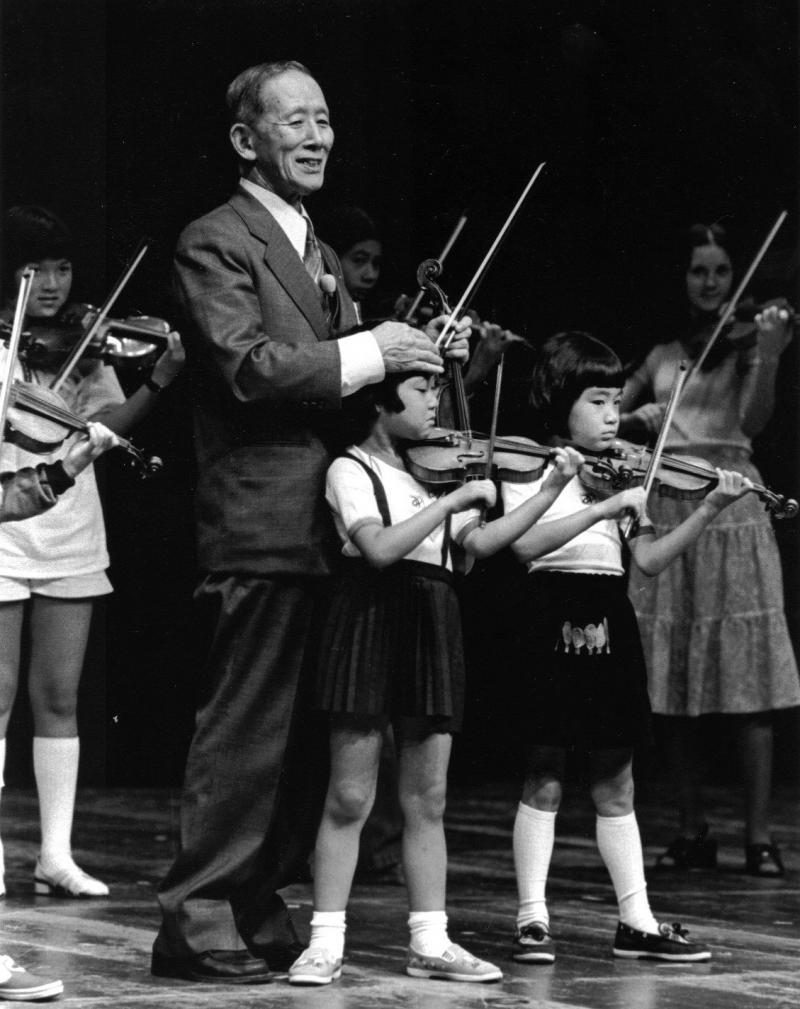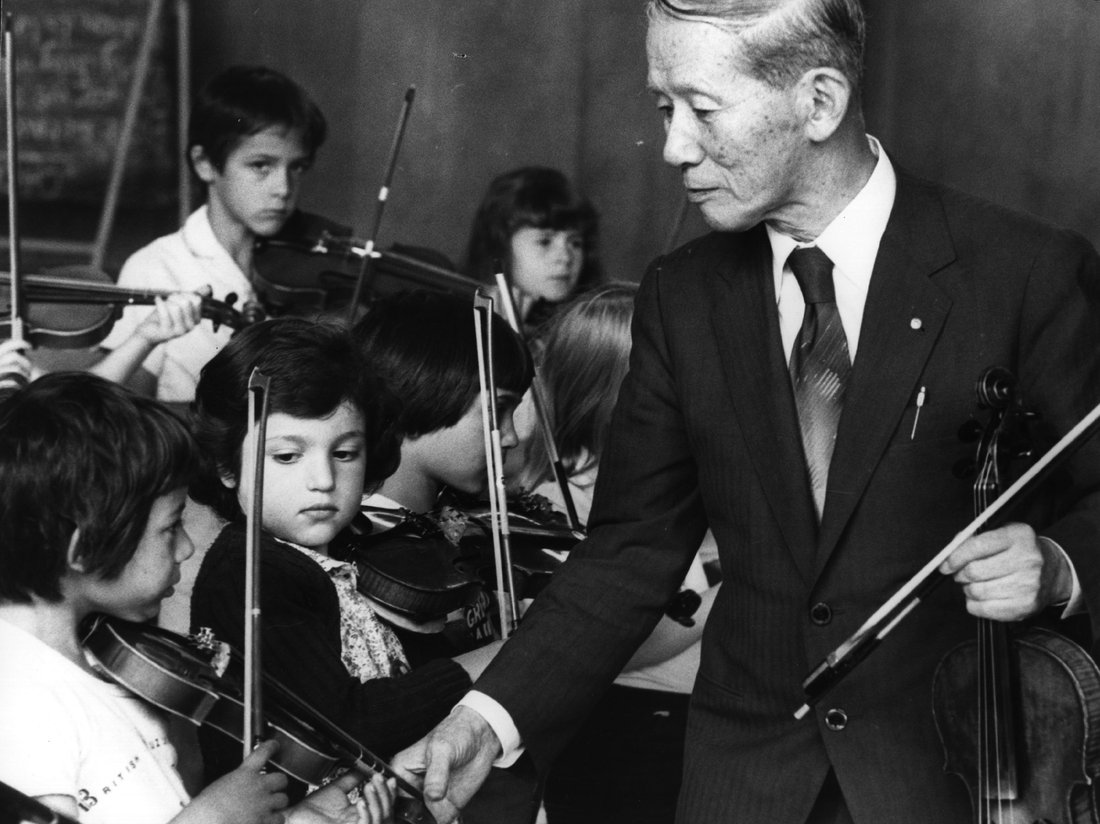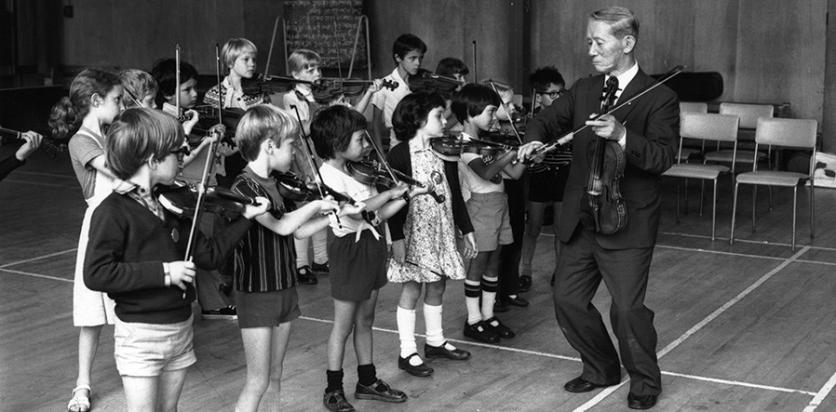Washington Crossing Violin & Viola Studio: Carol Gwen Kiefer
Talent Education

Dr. Shinichi Suzuki

The Suzuki Method is based on the principle that all children possess ability and that this ability can be developed and enhanced through a nurturing environment. All children learn to speak their own language with relative ease, and if the same natural learning process is applied in teaching other skills these can be acquired as successfully. Suzuki referred to the process as the Mother Tongue Method and to the whole system of pedagogy as Talent Education.
Shinichi Suzuki (1898-1998) was born in Japan and studied western music in Germany in the 1920's. He first began teaching young children in Japan in the 1930's and further developed his ideas and philosophy of teaching during the post-war period. His approach to teaching has now spread to many parts of the world and is proving increasingly successful everywhere. Because he was a violinist, he first applied his ideas to the teaching of violin, but it has since been used with many other instruments, in nursery school teaching and other more general areas.
The important elements of the Suzuki approach to instrumental teaching include the following:
-
An early start (aged 3-4 is normal in most countries)
-
The importance of listening to music
-
Learning to play before learning to read
-
The involvement of the parent
-
A nurturing and positive learning environment
-
A high standard of teaching by trained teachers
-
The importance of producing a good sound in a balanced and natural way
-
Core repertoire, used by Suzuki students across the world
-
Social interaction with other children: Suzuki students from all over the world can communicate through the language of music
The Suzuki method has enabled many children to play music to a high standard. Substantial numbers of Suzuki trained students have indeed become highly acclaimed professional musicians. However, the training of professionals is not the main aim: the emphasis throughout is on the development of the whole child, on education through music. Dr Suzuki himself always said that his wish was to foster the human qualities in the child. At every opportunity he called on politicians, teachers and parents to ensure that the full potential of every child is developed:
“I want—if I can—to get education changed from mere instruction to education in the real sense of the word—education that inculcates, brings out, develops the human potential, based on the growing life of the child. That is why I am devoting my efforts to furthering Talent Education: what a child becomes depends entirely on how he is educated. My prayer is that all children on this globe may become fine human beings, happy people of superior ability, and I am devoting all my energies to making this come about, for I am convinced that all children are born with this potential.”
InternationalSuzuki.org

Dr. Shinichi Suzuki in America
The Basic Principles of the Suzuki Method Using the Mother Tongue Approach
Every child can be educated
All parents know that their child can learn their native language. This ability to master their mother tongue allows parents to nurture and encourage their children with confidence and infinite affection. They realize that this is not an acquired knowledge but an ability inborn in all human beings.
Learning begins the day a child is born
A child who is raised from a very young age with love and attention will develop more successfully than a child whose education beings at the traditional “school age”. Parents are experts in their own language and feel comfortable teaching their mother tongue to their children. Such an accomplished teacher fosters only the highest ability in their students.
“Intuition” is a very important principle of talent education
One of the most fully developed abilities of human beings is intuition, without it we could not learn our mother tongue so successfully. A mother speaks kindly to her child from the first day. Her smile and warmth in conjunction with her spoken words develops the child’s language ability. If a child was spoken to without the love and warmth but with hard, written letters instead, would the child be able to learn to speak his mother tongue ? This is why there is no textbook required for a child to learn his native language.
Never force children to practice or rehearse
Parents never get angry with their children when they are not able to speak fluently. In this positive environment, children can develop without inhibition. A language has never been learned through the use of the command “study hard”. Is this not an ideal state of education ? Given a nurturing environment, children will develop their own language ability. Children enjoy speaking and will practice everyday amongst themselves. Through play with older children, the younger ones expand their vocabulary and are encouraged to develop their abilities.
Human ability develops through practice and exercise
Repetition and rehearsal every day prepares a child to move on to the next level of ability. Through repetition a child gradually becomes an expert in his mother tongue.
Why is it necessary to practice every day?
Memory is patterned and developed every day through constant repetition and positive reinforcement. Through observing the process in which children master their mother tongue, we see the necessity of repetition. A one year old child can speak only a few words but in only a few short years the same child can use his mother tongue fluently. It is an amazing amount of progress in a short period of time. Education, which does not bring about such success is a failure.
Children need to feel confident in their abilities and thoroughly master what they are learning
This is the most important thing to keep students from giving up. At first, they learn a simple skill carefully and repeat it again and again. Only after they have learned it thoroughly and been able to perform it enough for them to move on to the next step, will a child feel it now“easy”. The mother tongue approach can be used in other studies. Music is just one of the many fields that can benefit from the use of talent education. The concert performed by children is an example of how the approach can be used in music.
SuzukiMethod.or.jp
